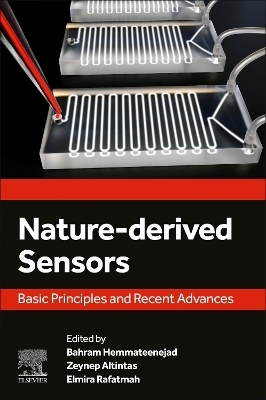
Nature-Derived Sensors
Elsevier - Health Sciences Division (Verlag)
978-0-443-22002-9 (ISBN)
- Noch nicht erschienen (ca. Januar 2025)
- Versandkostenfrei
- Auch auf Rechnung
- Artikel merken
This book begins with an introductory section dealing with fundamental and basic information about biomimetic mechanisms, materials, algorithms, and tools. Various classes of nature-inspired sensors are also discussed. This book is an excellent reference for graduate students and researchers working with biomimetic sensors, their industrial applications, data science, artificial intelligence, and the Internet of Things in the processing of sensory data.
Bahram Hemmateenejad is a professor of Chemistry at the Chemistry Department of Shiraz University. He received his Ph.D. in Analytical Chemistry from Shiraz University in 2002. As a fellow of the Alexander von Humboldt Foundation, he has visited different research institutes and universities in Germany. He won many national and international awards such as the Razi Festival award, Elsevier Chemolab Award, and TWAS young affiliate membership. He runs a Lab on the development and applications of different chemometrics methods in chemobiological interactions, computer-aided drug design colorimetric sensors, and paper-based analytical devices. He has been the author or co-author of more than 250 peer-reviewed scientific papers. He is serving as associate editor of “Journal of the Iranian Chemical Society and have been take part as scientific/organizing committee of many national and international seminars/conferences. He has supervised 65 PharmD, Master and PhD theses. Zeynep Altintas is a full professor and the Chair of Bioinspired Materials and Biosensor Technologies at the University of Kiel, Germany. She has been the Head of Biosensors and Receptor Development Group at the Technical University of Berlin since 2016. She completed her Ph.D. on biomedical sensors at the age of 25 with the outstanding Ph.D. student award. Her Ph.D. period brought her several other research prizes and fellowships. Following a one-year postdoc position at the Cranfield Biotechnology Centre, she continued her academic career as a faculty member of Biomedical Engineering at Cranfield University (the UK) until 2016. She leads an interdisciplinary research group in the domains of biosensor technologies, computational chemistry, receptor design, functional polymers and their applications in (bio)chemical sciences, nanomaterials applications, and design, synthesis, and characterization of biomimetic materials. Elmira Rafatmah received her M. Sc. degree in analytical chemistry from Shiraz university in 2013. She placed in the second position in Iran’s nationwide Ph.D. entrance exam in chemistry. She received her Ph.D. from Shiraz University in June 2019. Her research interest is a development of paper-based electroanalytical devices.
1. Introduction: Nature as an Inspiration Source
2. Fundamentals of Biomimetic Sensor Technology
3. Biomimetic Materials and Biomimetic Approaches in Micro/Nano-Structural Fabrications and Functionalization
4. Nature-Inspired Algorithms in Sensing Technology
5. Nature-Based Chemical Sensors
6. Optical and Electronic Nose and Tongue
7. Biodegradable and sustainable Sensors; Material and Applications
8. Biomimetic Strategies for Biosensing
9. Wearable Biomimetic Sensors
10. Bioinspired MEMS/NEMS Sensors
12. Ecosystem Creatures as Sensors
13. Physical sensors
14. Intelligent Sensors: Wireless Sensor Networks and Internet of Things
15. Aerospace Sensors Birds Inspire Flight Sensor
| Erscheint lt. Verlag | 23.1.2025 |
|---|---|
| Verlagsort | Philadelphia |
| Sprache | englisch |
| Maße | 152 x 229 mm |
| Themenwelt | Technik ► Maschinenbau |
| ISBN-10 | 0-443-22002-6 / 0443220026 |
| ISBN-13 | 978-0-443-22002-9 / 9780443220029 |
| Zustand | Neuware |
| Haben Sie eine Frage zum Produkt? |
aus dem Bereich


